“From Akoko Edo to Ibilo, the checkpoints were endless”
To curtail the spread of Covid-19 cases in Nigeria, on March 30, 2020, President Mohammed Buhari signed the Covid-19 Quarantine Regulation Act which regulates the conditions, time and form of quarantine compliance as well as the surveillance of individuals concerning health control measures. On April 27, Buhari ordered a nationwide dusk-to-dusk curfew and banned all interstate movement, sparing only essential interstate passengers. However, despite the standing rule, WAP’s Investigative Reporter, Beloved John took to the road, voyaging through Kogi State from Osun, to examine the reality of the President’s order.
“You can get to Kogi today but not from here.” This was said to me by a commercial bus driver, standing akimbo, with assurance running through his face over an interstate journey despite the rule bounding such trip.
I was almost squashed to the door by a middle-aged man who sat next to a mother of two, both kids struggling to seat independently.
The car convened seven passengers down to Owena. At the front seat, sat a man with bloodshot eyes and a woman who saw the need to wear a scarf but not a face mask.
As the car moved from the depot, a foul smell filled the air. At intervals, a passenger would give a loud hiss to express displeasure.
Inter-state movement through the Ilesha-Akure highway requires the cautious effort of both the drivers and the passengers, and it didn’t take long to come to terms with that. I hopped out of the car immediately the driver pulled over and let out a sigh of relief.
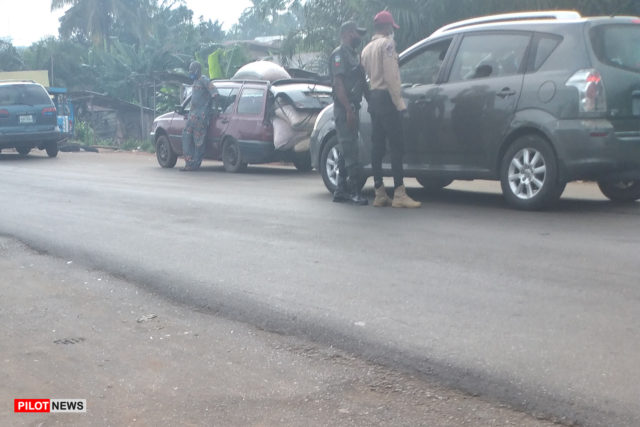
Sneaking past police checkpoint on foot
I boarded another car heading towards Akure shortly after I arrived at Owena.
A checkpoint was situated at the confines of Osun state. It was manned by both the Police and the Federal Road Safety Corps (FRSC). As we approached the checkpoint, Abbey instructed everyone to put on a face mask.
He looked agitated. He breathed in-and-out repeatedly as though air wouldn’t enter his lung, goosebumps laminated his skin. He moved slowly while we all sighted the checkpoint from a distance. The road was manned by both police and FRSC officials.
Soon, he stopped the car, muttered a few words of prayers and then asked me to get down. He pleaded that I walk past the checkpoint and rejoin the car at the other side to avoid suspicions.
My feet moved steadily down the road, each step hurriedly following the other. As I advanced, I could hear the friendly chatter of unfamiliar voices from behind me.
People moved past the line dividing Ondo and Osun in incessant flow. Most of them rushing along, oblivious of what was happening around them.
At the side of the road, groups gathered around cars stuck with goods. Each deliberating on how to get past the checkpoint. There was no time to eavesdrop on their conversations because I was also in a hurry.
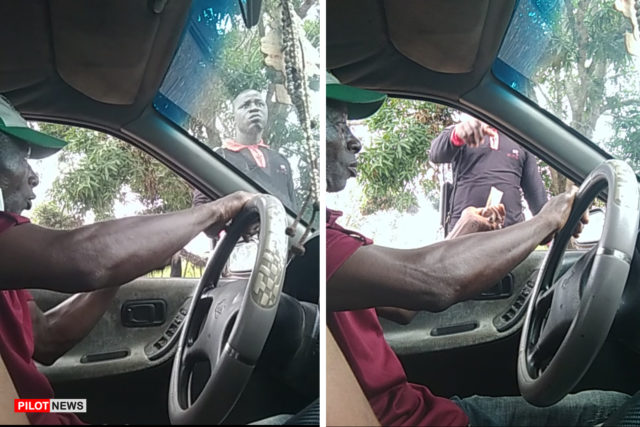
Officials at each checkpoint must be ‘settled’
Roughly ten minutes after I re-joined the car, we ran into two checkpoints barely twenty metres apart. The first was manned by three police officials while the other is a one-man military checkpoint.
As we approached the checkpoints, Abbey lamented over having to ‘settle’ officials at each checkpoint regardless of the distance between them.
Rather than enforce the ban implemented by the federal government, security officials littered the highway with roadblocks and barricades to extort money from lawbreakers.
At the police checkpoint, Abbey hailed the officer who attended to us before deliberately handing him an old fifty Naira note.
As we got closer the military checkpoint, Abbey although this time with a grin slipped his hand into his pocket and stretched out #100 notes to the officer at the checkpoint. He sped almost immediately afterwards.
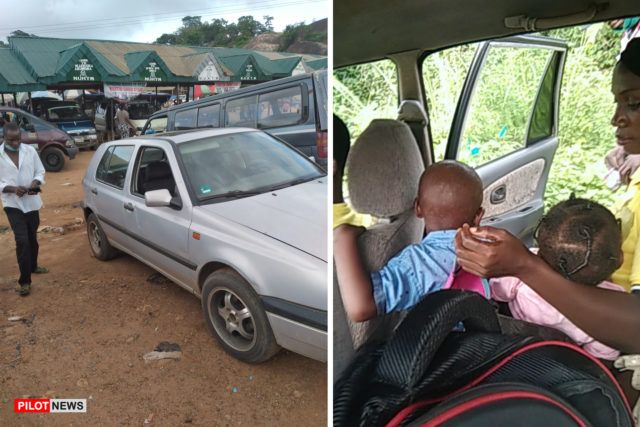
‘You can travel anywhere at any time’
Forty minutes past the time I arrived at a Benin car park and still the driver wouldn’t consent to the pleas of the passengers to start the journey.
I got to Akure at exactly 9:50 am. To continue my trip, I boarded a taxi from Oloko Park to Benin Car Park.
Cars parked in short queues, ready to move. Again, social distancing guidelines were completely ignored.
Business in the Benin Garage went on as usual. Cars parked in short queues, ready to move. Again, social distancing guidelines were completely ignored. No one seemed to reference the virus that had plunged this Nation with 12,801 confirmed cases and 361 deaths. It was as though they had been living in obscurity.
Seeing the rowdiness of the park, I walked over to James, a driver who works at the car park to find out how the park had managed to remain active despite the President’s order.
“There is no Corona here. So, there’s no problem. You can travel from to anywhere at any time you want and nothing will stop you” he said affirmatively.
The scorching sun boiled up tiny droplets of sweats on my skin as I stood by the black Mercedes car, waiting to be conveyed to my next destination.
Unlike Ilesha, drivers at the park had figured out how to move from one end to the other without consequences. The scorching sun boiled up tiny droplets of sweats on my skin as I stood by the black Mercedes car, waiting to be conveyed to my next destination.
After a long wait, the driver hopped into the car to commence the journey.
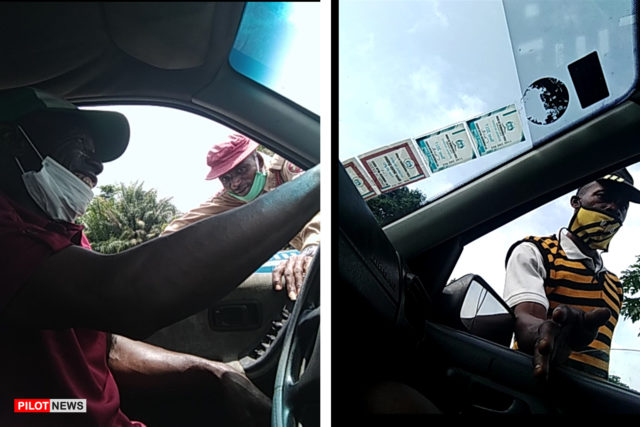
A sparkling fifty naira note buys silence
With checkpoints littered all over the highway, my journey to Kogi although fraught, was eventful.
The car convened seven persons from Akure to Kogi, passing through over 15 checkpoints. 2Km away from the park, I came across the 4th checkpoint. It was manned by the Federal Road Safety Corps (FRSC) officials. A middle-aged man flagged down our car.
Without much ado, Azeez, the driver slipped out a sparkling N50 note and handed it over to him.
I expected a query from the officer, even after the bribery. A query on how we indiscreetly flouted social distancing guidelines was still needed but the officer waved almost immediately.
At Oke Ogun is Checkpoint 5, manned by the Nigerian Civil Defense Corps. Over the next 7 Km, we ran into three Checkpoints guarded by men of the Police and FRSC.
Next checkpoint is at Isua. Two police officers stood by the side of the road, uninterested in the flow of movement.
Thirty minutes after, we ran into another checkpoint. A Civil Defense Officer, whose uniform had no tag stopped the car. He took a look at the driver, stretched his hand, received a N100 note and waved us goodbye.
A floodgate of checkpoints
A flurry of checkpoints welcomed us to Edo state. First, we ran into three closely situated checkpoints at Akoko-Edo. They are all guarded by FRSC men who worked collectively.
A middle-aged officer whose uniform had no tag attended to us at the first checkpoint. He leans forward, his eyes wandering to each corner of the car.
‘’Oga, I don’t have change,’’ the driver said pulling out #200.
He took the money from him and directed him to one of the officers guarding the third checkpoint.
“Go there and collect your change from him”
The officer is a tall slender man whose tag read Omiage Festus.
He frowned at drivers, his voice hoarse. Having gotten a signal from his colleague, he brought out #100 from his back pocket and gave it to the driver.
Security Officials allocate numbers
Next, is a military checkpoint manned by two men. As expected, the driver quickly slipped in his hand but this time brought out a #200 note.
“Oga, what of number? You never give me the number,” He yelled, calling back the attention of the militant who made to leave immediately.
In response, He stretched out three fingers without looking back.
“Okay, You mean three! Three!”
It was easy to note the excitement in his voice. The number was to help buy his way back to Kogi upon his return for free. From Akoko Edo to Ibilo, the checkpoints were endless.
We ran into an FRSC checkpoint about 5km into Ibilo, rather than the usual hand stretch, the driver was asked to step out of the car.
While we all maintained our position in the car, He ransacked the car booth, conversed with the driver for about five minutes before releasing us.
Ten kilometres after is an empty military checkpoint, followed by a Police checkpoint. It was exactly 2:10pm when the driver pulled over at Okene, Kogi state.
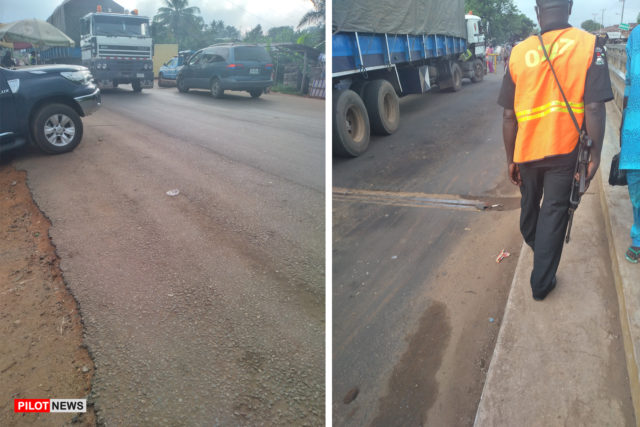
From Kogi back to Osun
My return journey to kogi kicked off at 2:20pm. Knowing that the day was far spent. I boarded a car heading to Akure no sooner than, I had arrived. With just two passengers, social distancing was unintentionally maintained making the journey less nerve-wracking.
Transiting out of Kogi, we ran into only two police checkpoints manned by officials who were less interested in the flow of traffic. They waved at intervals, signifying to confused drivers that they are free to move.
This time, highway security officials took a quick look at the driver before flagging down a car. From Okene to Edo were a floodgates of checkpoints but no one stopped us.
Moving on, we crossed to Ondo, passed through a custom checkpoint to Isua, drove past a FRSC checkpoint point at Isua Akoko.
Still in Isua Akoko, we ran into another Checkpoint. It was manned by the MOPOLS. An officer stops us with his name, Umoru clearly written on his badge.
Umoru stared at Gambo quietly. He was certain Gambo knows what to do.
Gambo hesitated at first, he felt entitled to a free pass since he had met the officer earlier that day but seeing that Isaiah was not interested in his story, he angrily pointed a fifty Naira note at him.
From Oba Akoko to Owo, we came across 3 empty checkpoints, one FRSC and one Custom Checkpoint. En route, Gambo turned right, passed through Akungba onto Ikare road to avoid bribery-befuddled officers.
Bike riders convey passengers across Ondo/Osun state
It was past 6 pm when Gambo made a stop at the Benin Garage. With the curfew in place, Gambo urged that I reached for my destination with a bike.
Accordingly, a bike conveyed me to Oloko and next; a cab to Ilara Mokin. I panicked seeing that the day was almost over but the bike men were certain they could convey me to Osun through an alternative route around the Ondo-Osun boundary.
The route was busy, many took the alternative route as well. Break lights illuminated the road as bike men rode to and fro.
“We cannot get pass the border through the highway but there’s another way out. There is checkpoint point around there. We have to be careful, I don’t want any trouble. Madam please, incase, it gets too difficult or if the officers are adamant, I would have to drop you close to the checkpoint. But not to worry, the chance am,” he said.
The route was busy, many took the alternative route as well. Break lights illuminated the road as bike men rode to and fro.
We moved closer to the checkpoint at Olu and he later introduces himself, asked that I get down and walk.
Just like many others, he push the bike quietly pass the checkpoint to avoid calling the attention of the officers who were nowhere near their post. Back on the bike, Olu rode down to the border and stopped by the side of the highway. From there, I walked down, back to Osun state. I checked for the time on my phone, it was exactly 7:15pm.
Even as a deadly respiratory disease plunged the Nation, the penchant of the Nigerian highway security officials for bridbery remains unabated. Transiting from Osun to Kogi despite the ban on interstate movement is a piece of cake with a bundle of fifty Naira notes.
All effort to contact Frank Mba, the spokesperson for the Nigeria Police Force to get his side of story remained unsuccessful as of press time. Calls put across to his mobile phone were unanswered and messages sent were not replied.
- Breaking: Ohanaeze President General, George Obiozor, confirmed dead - December 28, 2022
- US to support NDLEA on improved intelligence gathering capacity - December 27, 2022
- Why diversified HIV/AIDS prevention tools matter for women - December 26, 2022

